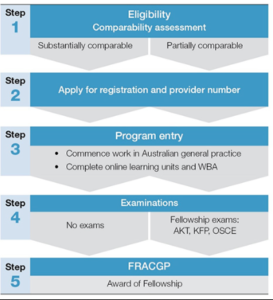Emma is currently travelling around Australia, visiting the wonderful medical centres to gain insights into where you could be working and what they seek in GP recruits. We’re committed to keeping you informed about easing your transition into Australia general practice.
During our conversations with GP owners and exploring the changing landscape of general practice, one recurring topic was whether GPs coming to Australia needed to have a specific area of interest While its not mandatory, many clinic owners suggested that it would be useful for an incoming GP to have an area of clinical interest to complement their practice.
Let’s discuss this further.
Do you need to have a clinical interest to practise as a GP in Australia?
The short answer is no. Many traditional general practices seek well-rounded GPs with comparable qualifications and experience and a great team fit into the practice. However, some practices view having a clinical interest as a great way to build your patient base and ensure a consistent workload.
Which Clinical interests are beneficial?
Personal Interest: Pursuing a field of medicine you’re passionate about is an excellent starting point.
Community Needs: Local community demands may vary based on practice location and patient demographics. However, certain clinical areas are generally in demand across Australia, including;
– Women’s Health and the ability to fit coils and implants is highly desirable
– Chronic disease management
– Minor Surgery
– Dermatology
– Mental Health
– Elderly care including Aged care facilities
Don’t limit yourself to these areas, the GPs I spoke to had wide and varied interests from geriatric care to medical cannabis to sports medicine.
Why do I need a specialist interest?
As mentioned, this is not an absolute requirement however having a specialist interest can complement general practice in several ways:
Improving Healthcare Access: Managing complex cases within the practice reduces pressure on specialist waiting times and can offer more affordable care options for patients.
Reducing the referrals to Specialists: If a patient presents with a particular condition, the practice will refer the GP surgery to the most appropriate doctor. This allows the patient to be treated within the clinic rather than elsewhere.
As patients currently have the choice of GP and can register with more than one GP practice, going to a preferred doctor with an interest in their care benefits both patient and doctor.
How will it help you in GP in Australia?
Increased earning potential
– Many practices have or are moving to a mixed billing setting where they charge some patients and bulk bill others. It is still very common to bulk bill children, pension, and health care holders. In this scenario, the private fees charged for minor surgery, dermatology, fitting coils, etc are much higher.
– When bulk billing a patient, having an interest in aged care or chronic disease management is excellent and will increase your potential by utilising chronic disease care plans where you can charge approx—$ 300 for a consult. Most practices have robust procedures in place for maximising income from these.
Increased Job satisfaction
– Some GP Owners I spoke to really enjoyed the varied aspects of general practice and being able to do a wide range of procedural work as well as standard family medicine kept his day interesting. Another has built his patient base around medicinal cannabis and any surgical work he can safely and competently do in the practice.
– Continuity of Care: For patients with chronic conditions, seeing a GP with a special interest in their specific health concern can be invaluable. It allows for a more streamlined and personalised approach to managing their ongoing needs, fostering a strong doctor-patient relationship.
Building your Patient Base
With the nature of general practice, there is an element of building your patient base which can take between 3 – 6 months. Some practices may have a retiring GP or have had to close their books and are turning patients away. Others may have a huge growth of housing in the area and expect a large increase in patients for your arrival.
In any practice, however, before you arrive, the team will be advertising you as a new doctor. Marketing will be done in the local area to let the patients know you are available for appointments. This can be greatly enhanced if you have any area of interest to complement the team and attract patients who need your specialist care. I found it useful having chats with the Australian doctors (many of whom are UK-trained and have made the transition) and getting their insights into ways to manage your practice in Australia.
Conclusion
Transitioning to general practice in Australia offers autonomy in managing your workload and patient care. Conversations with Australian doctors, many of whom underwent similar transitions, provided valuable insights into navigating the Australian healthcare landscape.
If you would like to find out more or have a chat, please get in touch +44 7983 685945,
You can check out our latest GP Jobs here









